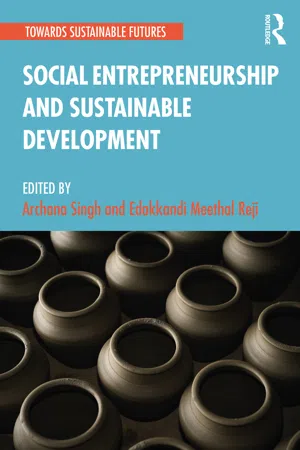
Social Entrepreneurship and Sustainable Development
- 254 pages
- English
- ePUB (mobile friendly)
- Available on iOS & Android
Social Entrepreneurship and Sustainable Development
About This Book
This volume discusses the seminal interface between social entrepreneurship and sustainable development along with their inter-linkages. It traces the role of social entrepreneurship and innovations in societal transformation in creating sustainable societies, especially in developing nations. It explores how social entrepreneurship and enterprise is integral to the promise of fostering opportunities for socially disadvantaged groups (including the poor, women, and young people), as well as in addressing environmental and ecological issues apart from wealth creation.
The book presents key concepts, case studies, and multiple innovative models involving social entrepreneurship, such as green financing, serial social entrepreneurship, sustainable livelihood creation, and well-being, in addition to highlighting global sustainable development goals of the United Nations. The chapters are organised under the broad themes of sustainability of the organisation, sustainability of the community, sustainability of the development, and sustainability of the community–organisation interface. They examine social change, social innovation, social enterprise, small and micro-enterprises, microfinance institutions, inclusive growth, education, productivity, physical health, waste management, energy retention, self-reliance, and corporate social responsibility. They contain emerging research issues in the field as well as critical assessments while bringing together theoretical and practitioners' perspectives.
This book will be useful to scholars and researchers of development studies, social entrepreneurship, sustainable development, environmental studies, public policy, and political sociology. It will also greatly interest professionals from non-profit, corporate, and public sectors, other development practitioners, and international bodies.
Frequently asked questions
Information
PART 1
Sustainability of organisation
1
SOCIAL ENTREPRENEURSHIP AND SUSTAINABLE DEVELOPMENT
Introduction
Theoretical underpinning

Methodology
| Sector | Non-profit social enterprises depended on external funding such as charity, donations, and also grants and subsidies from the government | Sustainable non-profit social enterprises with combined income of charity, grant, and own generated income; not-for-profit self-sustainable social enterprise, or hybrid social enterprise | For-profit social enterprises (social enterprises registered as private limited companies, but their primary mission is solving a social problem, creating social value, and bringing social change) |
| Health | SNEHA: Society for Nutrition, Education and Health Action, Mumbai (Dr. Armida Fernandez, Founder) SNEHA’s initiatives target both care seekers and care providers in order to improve urban health standards. On the one hand, SNEHA worked at the community level to empower women and slum communities to be catalysts of change in their own right. On the other hand, SNEHA collaborated with existing public systems and care providers to create sustainable improvements in urban health.The head office of SNEHA is located in Dharavi, Mumbai (Maharashtra). | Narayana Hrudyalaya Pvt. Ltd.,Bengaluru (Dr. Devi Shetty, Founder) In order to achieve his aim of providing affordable and accessible health care delivery for the masses worldwide, Dr Shetty is following a hybrid model and relying on economies of scale. He has three types of packages for the patients: general, charitable, and patients insured under govt’s micro health insurance programmes. However, the quality of services was the same across all types of patients in all the network hospitals of NH.The headquarter of Narayana Hrudayalaya Hospitals is in Bengaluru. | Vaatsalya Healthcare Solutions Pvt. Ltd, Bengaluru (Dr. Ashwin Naik, Founder) Started in 2005 as India’s first hospital network focused on tier-two and tier-three towns, Vaatsal... |
Table of contents
- Cover
- Half Title
- Series Page
- Title Page
- Copyright Page
- CONTENTS
- List of figures
- List of tables
- Foreword
- List of contributors
- List of abbreviations
- Introduction
- PART 1 Sustainability of organisation
- PART 2 SUSTAINABILITY OF COMMUNITY
- PART 3 SUSTAINABILITY OF DEVELOPMENT
- PART 4 SUSTAINABILITY OF COMMUNITY AND ORGANISATION INTERFACE
- Glossary
- Index